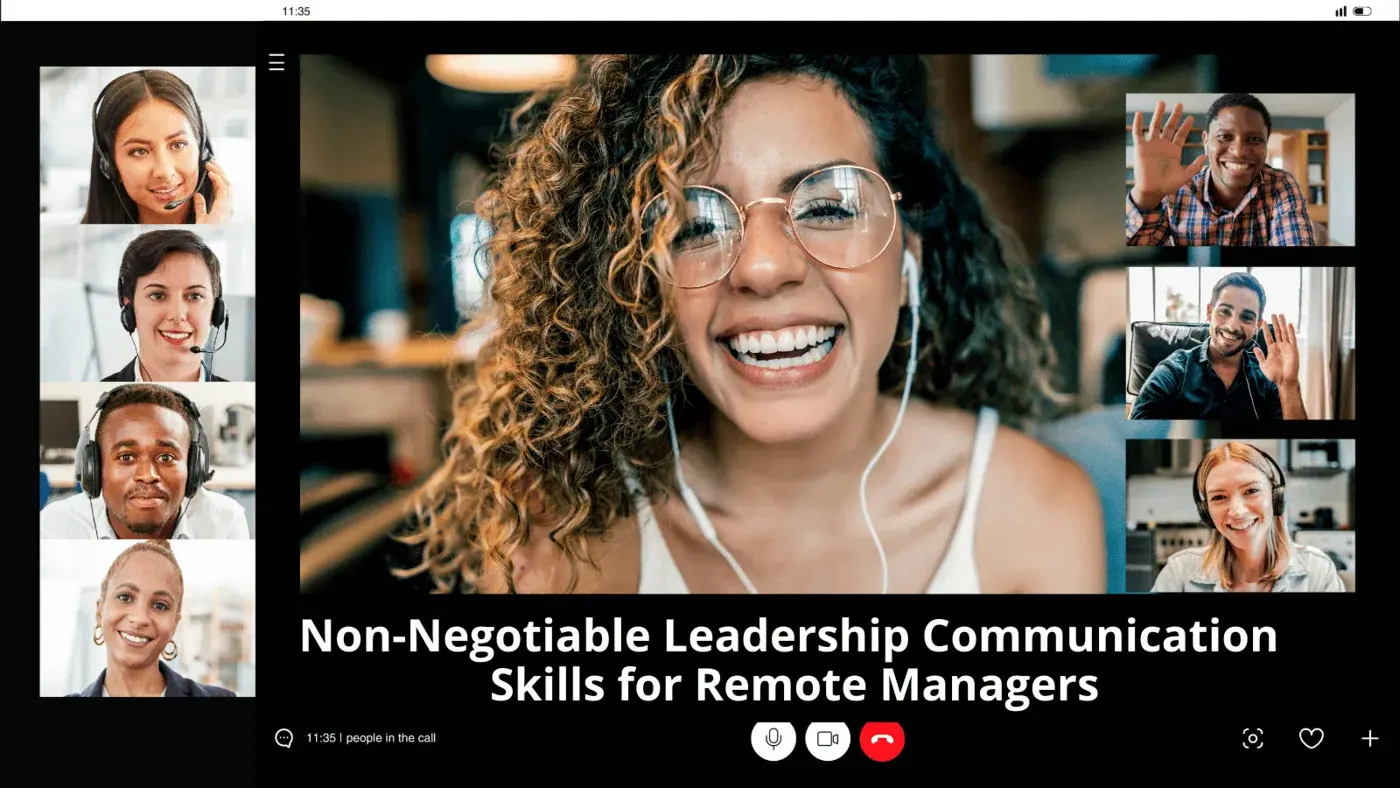7 Leadership Communication Skills for Managing a Remote Team
By Gaurav Sharma, founder and CEO of Attrock, a results-driven digital marketing company he grew an agency from 5-figure to 7-figure revenue in just...

By Indiana Lee, a freelance journalist specializing in business operations, leadership, and marketing, including how to fix communications issues in the workplace.
Congratulations — you're the boss! You have the privilege of guiding teams to achieve results. But don't let a little power go to your head.
Every good boss wants to know how to be a better boss. Being the boss comes with significant responsibilities, one of which is considering what you could be doing better.
As a good boss who wants to be a better boss, you know that a commitment to continuous learning is good for you, your employees, and the bottom line.
Need help becoming a better boss Let's talk!

The first step to being a better boss is learning how to give and receive feedback using the principles of Radical Candor.
Great leaders understand the crucial importance of communication and that soliciting feedback as well as giving kind and clear criticism and specific and sincere praise is how you build trust with your team.
They also adopt a curious mindset to gauge how their feedback is landing and they adjust accordingly. Finally, the best bosses don't just adopt Radical Candor, they encourage their employees to practice it with each other.
While creating a culture of Radical Candor is the first step on the path to being a great boss, it’s not the only step. Here are some simple steps you can take to become a better boss.
The first step in learning how to be a better boss is understanding that it’s not about power but rather building strong workplace relationships. It is important to find balance with your management style and avoid being too authoritative or autocratic when leading a team.
Instead of simply giving orders, try to make your team active participants in projects and decision-making. This does not mean giving up control entirely, but rather, inviting your team to share their opinions on tasks and strategies.
Be willing to explore their ideas as a part of your due diligence throughout project planning and execution. Additionally, delegating key leadership tasks to workers who show initiative is a practice especially important for new managers.
If you want to know how to be a better boss, it is important to understand that team buy-in plays a vital role in the success of any project. When employees are committed, inspired, and aligned with the project's goals, they can provide diverse skill sets and contribute to the project's outcomes.
When employees are actively involved in all aspects of work, it shows that their expertise, experience, and individual perspectives are recognized and valued.
This recognition can be accomplished in part by giving sincere praise, since appreciation can significantly enhance an employee’s confidence and ensure they continue applying their skills and personal attributes, knowing that they are crucial to your company's success.
Recognizing that your workers aren't automatons is an important part of being a great boss. As a leader learning how to be a better boss, it’s your ethical duty to take the time to demonstrate that you put workplace wellness first by caring for the people who work for you as human beings.
This not only shows that you value them, but it also minimizes absenteeism and quiet quitting which affects everybody on the team.
One of the key areas of focus here is helping team members avoid both the short-term and long-term effects of burnout. This is a serious condition that can start with experiences of fatigue and loss of motivation, before graduating to serious physical illnesses, such as high blood pressure.
The causes of burnout tend to revolve around prolonged exposure to workplace stress, working overlong hours, a toxic company culture, and the need to juggle multiple projects, among others. These put you as a leader in a position of responsibility to address such challenges.
So, what can you do to prioritize worker wellness?
Perhaps most importantly, take the time to check in with individual workers regularly through effective one-on-one meetings. Make sure your team members know they can come to you with any concerns about how the workplace may be negatively affecting their mental and physical wellness. Moreover, demonstrate empathy by inviting their perspectives and taking timely action to remedy problems.
A lot of people have been in situations where they feel like their boss is not being entirely open and honest with the team. Whatever the reason behind this is — whether there are sensitive business situations involved or a misguided sense of superiority — it’s not likely to result in a receptive workforce.
Committing to sharing information that affects the team as soon as you are able helps you build the trust that is essential for leadership. It demonstrates your ability to be a true thought partner and highlights your commitment to being a better boss.
Your Radical Candor skills are useful when it comes to implementing transparency in a practical yet mindful way. Great bosses use their communication skills to share relevant information openly, but not in a brutally honest way that is overly harsh or insensitive.
Instead, it's about being aware of the context in which the information is being used and the people with whom you are communicating. By practicing Radical Candor, you can build trust and create a positive environment where everyone feels comfortable sharing their thoughts and ideas.
For instance, say the team’s performance over the last few quarters was below expectations, affecting profitability. Trying to protect them from this difficult news might seem kind, but it helps neither them nor the business.
At the same time, melodramatic statements about how it’s putting the company at risk is a needlessly obnoxious approach that can negatively impact their self-esteem and engagement.
@radicalcandorofficial we've all been there and it's hard caring personally + challenging directly > obnoxious aggression/ruinous empathy #Meme #MemeCut #RadicalCandor #FYP #Feedback #Leadership #WorkLife #CorporateLife #OfficeLife #9to5 #Professional #Career #Business #Entrepreneur #Teamwork #Leadership #Productivity #Success #WorkHardPlayHard #BusinessTips #WorkplaceCulture #WorkLifeBalance #OfficeHumor #CareerAdvice #BossLife #WorkHumor ♬ original sound - Radical Candor
The result is that your candor helps develop more trusting relationships within the team that help everyone to thrive.
Improving your leadership skills as a boss can have a significant positive impact on your team's performance and their overall satisfaction in the workplace. It demonstrates your genuine concern for their working experience and your commitment to being an effective leader.
However, in addition to adopting best practices for management, it is also essential to nurture your individual qualities. Your unique characteristics can inform a management approach that is beneficial for everyone involved, making it a win-win situation.
***
Indiana Lee is a freelance journalist specializing in business operations, leadership, and marketing. Her writing aims to provide insights that promote personal and organizational growth. Connect with her on LinkedIn
————————————————————————————————————————————————————————————–
Looking to become a better boss? Then you need The Feedback Loop (think Groundhog Day meets The Office), a 5-episode workplace comedy series starring David Alan Grier that brings to life Radical Candor’s simple framework for navigating candid conversations.
We’re offering Radical Candor readers 10% off the self-paced e-course. Follow this link and enter the promo code FEEDBACK at checkout.

By Gaurav Sharma, founder and CEO of Attrock, a results-driven digital marketing company he grew an agency from 5-figure to 7-figure revenue in just...

By Indiana Lee, a freelance journalist specializing in business operations, leadership, communication, and marketing.

By Zachary Amos, a features editor focused on trending technology topics, including how to fix communications issues in the workplace.